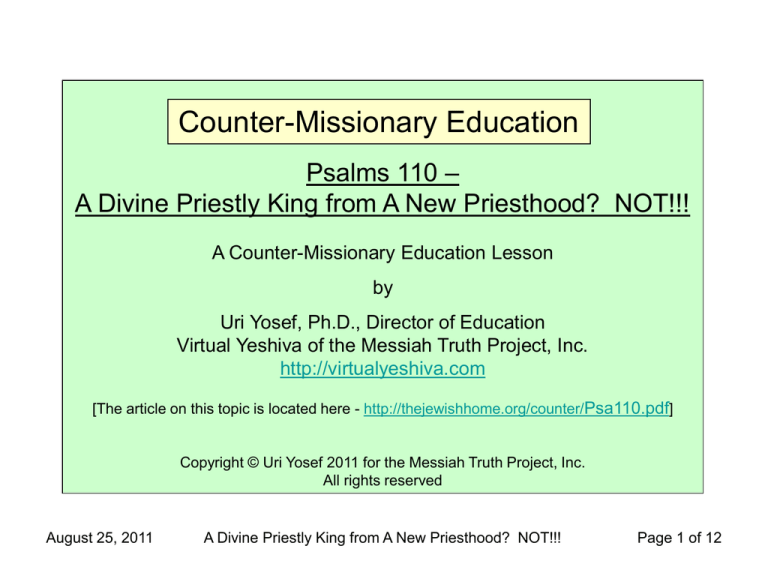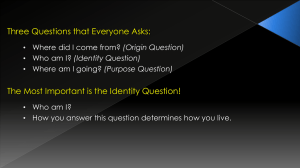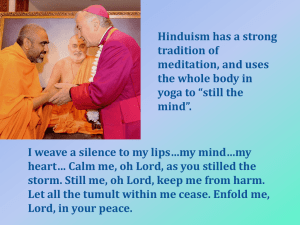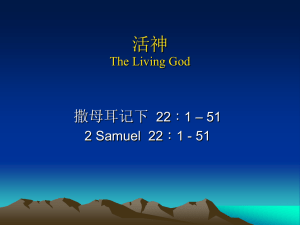
Counter-Missionary Education
Psalms 110 –
A Divine Priestly King from A New Priesthood? NOT!!!
A Counter-Missionary Education Lesson
by
Uri Yosef, Ph.D., Director of Education
Virtual Yeshiva of the Messiah Truth Project, Inc.
http://virtualyeshiva.com
[The article on this topic is located here - http://thejewishhome.org/counter/Psa110.pdf]
Copyright © Uri Yosef 2011 for the Messiah Truth Project, Inc.
All rights reserved
August 25, 2011
A Divine Priestly King from A New Priesthood? NOT!!!
Page 1 of 12
Introduction
The many direct references and allusions in the New Testament to the
110th chapter in the Book of Psalms has turned it into the source of
several popular so-called “messianic prophecies”, the alleged
fulfillment of which, by Jesus, are claimed to be the referenced
accounts in the New Testament.
Consequently, Psalms 110 contains a number significant so-called
"proof texts" in the portfolio of the Christian missionary, and these
allegedly foretell the divinity, priesthood, and proximity to God of the
Christian messiah, which, along with other attributes, are described in
various accounts throughout the New Testament.
A rigorous analysis of the Hebrew text in this psalm, and its placement
in the proper context, demonstrate how these claims have no support
from within the Hebrew Bible.
August 25, 2011
A Divine Priestly King from A New Priesthood? NOT!!!
Page 2 of 12
Psalms 110:1,2
King James Version Translation
Jewish Translation from the Hebrew
Hebrew Text
Psalms 110
Of David a psalm. The word of the
The LORD said unto my Lord, Sit Lord (
[YHVH]) to my lord (
1 thou at my right hand, until I make [ladoNI] (or, to my master): "Sit at My
thine enemies thy footstool.(i)
right hand, until I make your enemies
a footstool at your feet."
The LORD shall send the rod of
2 thy strength out of Zion: rule thou
in the midst of thine enemies.
The Lord (
[YHVH]) will send the
staff of your might from Zion; rule in
the midst of your enemies!
(i) Direct "quotes":
Matthew 22:44(KJV) - The LORD said unto my Lord, Sit thou on my right hand, till I make thine enemies thy footstool?
Mark 12:36(KJV) - For David himself said by the Holy Ghost, The LORD said to my Lord, Sit thou on my right hand, till
I make thine enemies thy footstool.
Luke 20:42-43(KJV) – (42) And David himself saith in the book of Psalms, The LORD said unto my Lord, Sit thou on
my right hand, (43) Till I make thine enemies thy footstool.
Acts 2:34-35(KJV) – (34) For David is not ascended into the heavens: but he saith himself, The Lord said unto my
Lord, Sit thou on my right hand, (35) Until I make thy foes thy footstool.
Hebrews 1:13(KJV) - But to which of the angels said he at any time, Sit on my right hand, until I make thine enemies
thy footstool?
Allusions:
Matthew 26:64(KJV) - Jesus saith unto him, Thou hast said: nevertheless I say unto you, Hereafter shall ye see the
Son of man sitting on the right hand of power, and coming in the clouds of heaven.
Colossians 3:1(KJV) - If ye then be risen with Christ, seek those things which are above, where Christ sitteth on the
right hand of God.
Hebrews 8:1(KJV) - Now of the things which we have spoken this is the sum: We have such an high priest, who is set
on the right hand of the throne of the Majesty in the heavens;
Hebrews 10:12(KJV) - But this man, after he had offered one sacrifice for sins for ever, sat down on the right hand of
God;
1Corinthians 15:25(KJV) - For he must reign, till he hath put all enemies under his feet.
August 25, 2011
A Divine Priestly King from A New Priesthood? NOT!!!
Page 3 of 12
Psalms 110:4,5
King James Version Translation
Jewish Translation from the Hebrew
Hebrew Text
Psalms 110
The LORD hath sworn, and
will not repent, Thou art a
4
priest for ever after the order
of Melchizedek.(ii)
The Lord at thy right hand
5 shall strike through kings in
the day of his wrath.(iii)
The Lord (
[YHVH]) has sworn, and
will not change His mind, "on my word,
you are to serve for ever, King of
righteousness."
The Lord (
[A-donai]) is at your
right hand, He has crushed kings in the
day of His wrath.
(ii) Hebrews 5:6,10(KJV) – (6) As he saith also in another place, Thou art a priest for ever after the order of Melchisedec.
(10) Called of God an high priest after the order of Melchisedec.
Hebrews 6:20(KJV) – Whither the forerunner is for us entered, even Jesus, made an high priest for ever after the
order of Melchisedec.
Hebrews 7:17,21(KJV) – (17) For he testifieth, Thou art a priest for ever after the order of Melchisedec.
(21) (For those priests were made without an oath; but this with an oath by him that said
unto him, The Lord sware and will not repent, Thou art a priest for ever after the order of
Melchisedec:)
(iii) Romans 2:5(KJV) - But after thy hardness and impenitent heart treasurest up unto thyself wrath against the day of
wrath and revelation of the righteous judgment of God;
August 25, 2011
A Divine Priestly King from A New Priesthood? NOT!!!
Page 4 of 12
Summary of the Christian and Jewish Perspectives on Psalms 110
Christianity ()
Judaism (Y)
This is a messianic prophetic psalm
as indicated by the many explicit
applications of texts from it to Jesus
throughout the New Testament. The
significant “Old Testament”
prophecies and their accounts of
fulfillment in the New Testament on
which this perspective is based are:
Regardless of who its author was, the
overall theme of Psalms 110 is that it
speaks of David's legendary power,
which came through God’s favor that
was earned by his righteousness.
The author assures David of victory
over his and his people’s enemies.
Several interpretations exist:
• The Messiah would be the Lord
• Two common interpretations say the
(Psalms 110:1a/Matthew 22:41-45)
psalm is about David or Abraham
• The Messiah would be at the right
hand of God
(Psalms 110:1b&5/Mark 16:19 &
1Peter 3:21-22)
• Another interpretation says the
psalm is a prayer by David, in which
he recalls God’s help to Abraham in
his battle with the 4 kings and asks
God to help him fight his enemies
• The Messiah would be a Priest in
the order of Melchizedek
(Psalms 110:4/Hebrews 6:17-20)
• A messianic interpretation has the
Jewish Messiah victorious over all
his and Israel’s enemies
August 25, 2011
A Divine Priestly King from A New Priesthood? NOT!!!
Page 5 of 12
Unraveling the “Mystery”
The Christian and Jewish perspectives on Psalms 110 cannot both be valid. A
rigorous linguistic and contextual analysis of the Hebrew text, particularly as it
concerns the first few verses that form the basis for the Christian perspective, is
required in order to identify the valid possible interpretations of this psalm.
As a first step in the analysis, it is helpful to consider the superscription of
Psalms 110, which the KJV leaves out, since it may contain helpful clues.
Who composed Psalms 110?
In the Hebrew text, the superscription reads
(ledaVID mizMOR), where
(le-) is a preposition meaning to or for, by,
(daVID) is the name David,
and
(mizMOR) is a psalm. This particular superscription could, therefore,
indicate that the psalm was composed either by David or for David, or possibly
dedicated to David. In other words, because of this ambiguity, it is not possible
to determine, with absolute certainty, that King David composed this psalm.
It is worth noting that, whereas the Christian perspective assumes that King
David is the author of Psalms 110, the Jewish interpretations do not make such
a unilateral assumption and work whether he or someone else composed it.
The next step in the analysis is to answer the question: Who is speaking to
whom in Psalms 110:1? The answer to this question holds the key to a correct
understanding of the entire psalm.
August 25, 2011
A Divine Priestly King from A New Priesthood? NOT!!!
Page 6 of 12
Unraveling the “Mystery” (continued)
Let’s take a closer look at Psalms 110:1 & Psalms 110:5 King James Version Translation
Jewish Translation from the Hebrew
Hebrew Text
Psalms 110
The LORD said unto my Lord,
Sit thou at my right hand, until I
1
make thine enemies thy
footstool.
Of David a psalm. The word of the
Lord (
[YHVH]) to my lord (
[ladoNI] (or, to my master): "Sit at My
right hand, until I make your enemies
a footstool at your feet."
The Lord at thy right hand shall
5 strike through kings in the day
of his wrath.
The Lord (
[A-donai]) is at your
right hand, He has crushed kings in
the day of His wrath.
Points to note:
• The first Hebrew term in v1, the Tetragrammaton,
, is rendered as “The LORD” in
the KJV, alluding to “God the Father” (the Creator), and as “the Lord” in the Jewish
translation (this is also the case in v2 & v4), a reference to the Creator.
• The next Hebrew term in v1,
, is rendered as “unto my Lord” in the KJV, alluding to
Jesus (“God the Son”), and as “to my lord (or, to my master)” in the Jewish translation,
pointing to a human being.
• The first word in v5,
(AdoNAI), another one of several common titles used in the
Hebrew Bible for the Creator, is rendered as “The Lord” in the KJV.
Can you tell what’s wrong with this “picture”?
August 25, 2011
A Divine Priestly King from A New Priesthood? NOT!!!
Page 7 of 12
Unraveling the “Mystery” (continued)
Answer: The KJV renditions are inconsistent!
Although both Psalms 110:1&5 speak of God (the Creator), their context is
different:
• Psalms 110:1 speaks of a time in the future, when the subject will be sitting to
the right of God (the Creator) and waiting till his enemies are subdued (Psalms
27:2,6).
• Psalms 110:5 speaks of past situations in which God (the Creator) intervened
and helped the subject defeat the enemy – God was present at this person's
right side, by the hand that held the weapon, to strengthen him (Isaiah 41:13,
Psalms 16:8, 121:5).
Yet, according to the respective renditions in the KJV, Psalms 110:1 speaks of
“the Lord” (Jesus [“God the Son”) sitting to the right of “The LORD” (“God the
Father” [the Creator]), whereas Psalms 110:5 speaks of “the Lord” (Jesus [“God
the Son”]) who is at the right of the subject being spoken of, namely, “the Lord”
– Jesus (“God the Son”).
This clearly makes no sense!
… And there is more …
August 25, 2011
A Divine Priestly King from A New Priesthood? NOT!!!
Page 8 of 12
Unraveling the “Mystery” (continued)
Let’s see how the KJV translators rendered all 24 instances of the Hebrew term
, and especially the nine cases where both
and appear in the same
verse:
Term
Pronunciation
#
Sample Citations
Correct
Translation
KJV Rendition
Genesis 24:36,54,56,
32:5,6,19,44:9,16(x2),33;
to/unto/for my
“… my lord/master”
1Samuel 25:27;
lord/master
2Samuel 19:29[28];
1Kings 1:2(x2), 20:9
(1)
ladoNI
24
1Samuel 24:6*,
25:28*,30*,31(x2)*;
“… the LORD” & “… my
2Samuel 4:8*;
the Lord & to/for
lord/master”
1Kings 18:13*;
my lord/master
1Chronicles 21:3*
Psalms 110:1*
The LORD & unto my Lord
(1) Since the specific term of interest is
, all 24 citations are shown. Since Psalms 110:1 is
one of nine cases among these 24 citation that contain both the Tetragrammaton
, and the
term
, all nine cases are marked with an asterisk (*).
Clearly, the KJV translation is incorrect and creates an internal inconsistency.
The answer to the question “Who is speaking to whom?” is that, the author of
the psalm, regardless of who that may have been, is reporting on what God said
to the person being referred to by the author as “my lord/master”.
August 25, 2011
A Divine Priestly King from A New Priesthood? NOT!!!
Page 9 of 12
Unraveling the “Mystery” (continued)
Now that we know it was God speaking to someone, the final step in the
analysis is to examine what was being said. In fact, God’s assurance of triumph
(Psalms 110:1-3) was already noted earlier. Although the battle scene and
victory described in the last three verses (Psalms 110:5-7) create difficulties for
the Christian perspective, such as v5 that was previously discussed, it is the
middle verse, Psalms 110:4, that requires special attention.
King James Version Translation
Jewish Translation from the Hebrew
Hebrew Text
Psalms 110
The LORD hath sworn, and will
not repent, Thou art a priest for
4
ever after the order of
Melchizedek.
The Lord (
[YHVH]) has sworn,
and will not change His mind, "on my
word, you are to serve for ever, King
of righteousness."
Christian missionaries claim this verse is a prophecy about Jesus being both
king (Messiah) and high priest, as Melchizedek was, and that this new and
superior priesthood replaced the Aaronic priesthood that was given to Israel
following the Revelation and giving of the Torah at Mount Sinai while they were
on their way to the Promised Land of Israel. The following versed from the New
Testament are used to support this claim:
Hebrews 7:3(KJV) - Without father, without mother, without descent, having neither beginning of days,
nor end of life; but made like unto the Son of God; abideth a priest continually.
Hebrews 7:21(KJV) - (For those priests were made without an oath; but this with an oath by him that said
unto him, The Lord sware and will not repent, Thou art a priest for ever after the order of Melchisedec:)
August 25, 2011
A Divine Priestly King from A New Priesthood? NOT!!!
Page 10 of 12
Unraveling the “Mystery” (continued)
Has the Melchizedek Priesthood Replaced Israel's Aaronic Priesthood?
Analyzing the Hebrew text in Psalms 110:4 in its proper context exposes the flaws in
the two supporting passages from the Epistle to the Hebrews. Here are the facts:
• The scriptures in force at the time of the crucifixion were the Hebrew Scriptures
• The Hebrew Bible separates the functions of kingship and priesthood – kings, the
political leaders cannot be priests, and priests, the spiritual leaders, cannot be kings
• Starting with King David, kings have to be his biological descendants and from the
Tribe of Judah
• Priests and Levites have to be from the Tribe of Levi
• The Aaronic Priesthood that emerged from the Tribe of Levi was established for
eternity, which rules out any other priestly order for Israel
• The term
(koHEN), most commonly used in the context of “a priest”, is also
used in reference to non-priests who serve in an official capacity (e.g., 2Samuel
8:18, 20:26, 1Kings 4:5)
• King David performed some priestly functions (2Samuel 6:14,17), as will the
Messiah do (Ezekiel 45:17, 46:12)
• The title
was traditionally borne by all kings of Jerusalem, such as the
righteous Gentile priest-king in the days of (the Gentile) Abram, (Genesis 14:18,22)
Therefore, the references to Jesus being “a priest for ever after the order of
Melchisedec” are irrelevant to Psalms 110 in particular, and to Judaism in general.
August 25, 2011
A Divine Priestly King from A New Priesthood? NOT!!!
Page 11 of 12
Summary
The Christian perspective on Psalms 110, which is based on mistranslations,
misinterpretations, and flawed reasoning, has no valid basis within the Hebrew
Bible and falls apart under rigorous scrutiny. Not only can Jesus not be the one
described as sitting to the right of God and qualify as the promised Jewish
King/Messiah, this priesthood “after the order of Melchisedec”, which appears
to have been conferred on him by the author of the Epistle to the Hebrews, is a
self-defeating argument, since Melchizedek was a Gentile, not a Jewish, priest,
and therefore irrelevant to Israel.
On the other hand, even though several different Jewish interpretations of
Psalms 110 have been proposed by the Sages, all can be validated vis-à-vis the
Hebrew Bible.
Conclusion:
• If Jesus was a Jew, then he cannot be a priest in a priestly order that is outside of
Judaism, such as the Melchizedek priesthood, since the Aaronic priesthood was
established exclusively and eternally for his descendants, who would all be of the
Tribe of Levi, to serve on behalf of Israel.
• If Jesus was a Jew and, as is claimed in the New Testament, ‘the son of David’, he
would have to be of the Tribe of Judah. Therefore he cannot be of the Tribe of Levi
and serve under the eternal covenant with Aaron and his descendants.
• If, on the other hand, Jesus was not a Jew, then, according to Torah, he cannot rule
as king of Israel.
August 25, 2011
A Divine Priestly King from A New Priesthood? NOT!!!
Page 12 of 12









